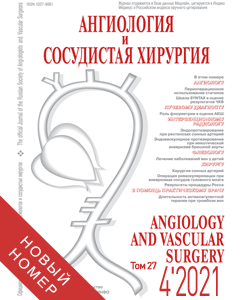Journal «Angiology and Vascular Surgery» •
2017 • VOLUME 23 • №3
Biochemical markers in blood serum of patients undergoing various methods of carotid endarterectomy
Kozyreva V.S., Shilova A.N., Karpenko A.A., Ignatenko P.V., Lomivorotov V.V.
Siberian Federal Biomedical Research Centre named after Academician E.N. Meshalkin under the Ministry of Health of the Russian Federation, Novosibirsk, Russia
The authors studied the concentration of CRP, sE-selectin, sP-selectin, sICAM-1, sICAM-3, sVCAM-1, sPECAM and endothelin-1 in blood serum of patients presenting with stenotic lesions of carotid arteries and undergoing various methods of carotid endarterectomy (CEAE): eversion CEAE (Group I) and CEAE using a xenopericardium patch (Group II). Within the time frame of the study, patients in both groups were found to have an elevated CRP level in the early postoperative period, having returned to the baseline values at 6 postoperative months, as well as an increase in the concentration of endothelin-1 at six months after surgery and a decrease of the sE-selectin concentration in the early postoperative period. The level of sP-selectin in Group II patients was noted to increase considerably six months after correction of stenosis. The content of sICAM-1 and sVCAM-1 did not differ in the early postoperative and baseline periods, and was noted to decrease 6 months after the operation. Group II patients demonstrated a decrease in the sPECAM concentration during postoperative day one, followed by returning to the initial values six months after CEAE.
The above-mentioned biochemical markers may be used during the postoperative follow-up period for early detection and appropriate correction of endothelial dysfunction and hyperplasia of the intima of the zone of reconstruction.
KEY WORDS: CRP, endothelin-1, adhesion molecules, endothelial dysfunction, carotid endarterectomy.
P. 27
ARCHIVES MAGAZINE
2021 (Vol.27)
2020 (Vol.26)
2019 (Vol.25)
2018 (Vol.24)
2017 (Vol.23)
2016 (Vol.22)
2015 (Vol.21)
2014 (Vol.20)
2013 (Vol.19)
2012 (Vol.18)
2011 (Vol.17)
2010 (Vol.16)
2009 (Vol.15)
2008 (Vol.14)
2007 (Vol.13)
2006 (Vol.12)
2005 (Vol.11)
2004 (Vol.10)
2001 (Vol.7)
2000 (Vol.6)
1999 (Vol.5)
1998 (Vol.4)
1997 (Vol.3)


